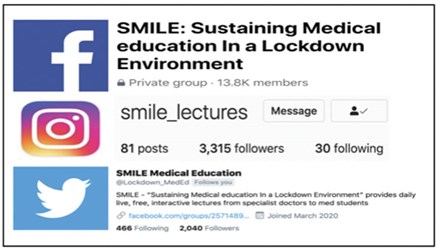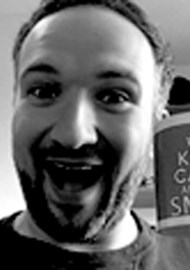
2020 posed challenges to medical education like never seen before. In an effort to contain and slow the spread of coronavirus all UK medical schools ceased or reduced face-to-face contact. This sudden, and for many, unexpected change resulted in pressures to transform medical education for an online audience. For some, this meant both students and teachers exploring new technology to accommodate educational needs in a truly original time.
SMILE is a free online access undergraduate medical education platform created by: myself, a urology trainee, Paul Foster, an orthopaedic trainee and Muntasha Quddus, a fourth-year medical student. All three of us are based in the south-west of the UK.
Starting as a small project providing online urology themed lectures via university surgical societies, it evolved to one of the most popular medical education platforms in Europe. SMILE has covered the majority of the recommended undergraduate GMC topics across 200 lectures by 71 different lecturers. There have been attendees from all UK medical schools as well as 33 countries overseas. Sessions have been fantastically well attended with a large number of sessions attracting over 1000 participants and one with a session record at 1400.
The mantra of SMILE was simple and threefold:
- Deliver high quality undergraduate medical education through a virtual medium on a daily basis.
- Keep it free and accessible to students across the world.
- Attempt to fill the educational void of medical school during the cessation of face-face university sessions.
The technology
One of the positives that did come out of 2020 was the widespread adoption of easy access video conferencing software. In 2019 ‘zoom’ remained a word more commonplace in photography or children’s cartoons. But during lockdown Zoom, and similar platforms, became an integral part of business, friendships, families and eventually education.
As I expect was the same for many, I was first exposed to Zoom during an online event with friends. It immediately became apparent that it was both reliable and easy to use. It didn’t take long for me to put it to the test and try it for teaching undergraduate students.
Packages, such as the Zoom webinar function, really do help to turn the laptop into a lecture theatre. Presentations can be shared, students can ask questions and there are even poll or questionnaire type areas to simulate an exam setting. Importantly, we worked hard to make the lectures an enjoyable and interactive experience by all means necessary, steering away from becoming a didactic video lecture service. Keeping the lectures live and utilising all the features of the Zoom webinar package maximised interactivity and kept SMILE unique.

Social media – an unpredictable growth
Without a doubt social media was key for the growth of SMILE; we maintained a presence on Facebook, Instagram and Twitter with approximately 14,000, 3000 and 2000 followers, respectively. Social media is used by SMILE to share upcoming lectures, lecture links and other useful resources.
Initially it allowed SMILE to contact various medical societies, sharing links of upcoming events and as it grew it worked as a way for other educators to contact us and develop numerous collaborative projects.
Importantly it also created a social media platform for students to contact each other, share educational resources and support each other through lockdown.
Did the students like it?
“SMILE is definitely the most popular provider of online lectures. They frequently have 1000+ students tuning into each lecture! Lectures run every day of the week. There are sometimes up to three lectures a day.”
Graduate Medicine Success
The most cohesive feedback ascertained on the work of SMILE was acquired via an electronic survey with 1306 responses from students and 71 responses from facilitators. Ninety-five percent of students reported that SMILE had been “extremely” or “very” useful in supplementing their learning during COVID.
It became apparent that students were not just attending lectures to improve their medical knowledge but also for social or even pastoral reasons. Seventy-one percent of students found COVID had increased their overall stress levels and 80% thought this was improved by SMILE. In particular, students praised the renewed senses of motivation and structure provided by SMILE.
We also demonstrated massive variations in content provided by universities throughout the United Kingdom. In August 2020 students stated they were attending 4.3 hours / week of university run lectures vs. 7.9 hours / week provided by SMILE.
Overall, students praised the enthusiasm of teachers as well as the informality and interactivity of each session. One criticism was time differences of the live lectures for those joining overseas. It was flattering to hear people from Australia, Thailand or the US were staying up to take part. The other common issue revolved around the technology itself. Although rare, if the lecturer had a weak internet connection it could be quite apparent when streaming. There was also one occasion where Zoom didn’t work for 24 hours, although Boris Johnson had the same issue that day so we didn’t feel too bad.
How did the teachers find it?
The SMILE team consisted of five dedicated members, of which at least one was present in every lecture to act as a moderator. Overall, 71 different lecturers volunteered their time and prepared sessions for SMILE. The clinical experience of lecturers ranged from core trainee to consultant with only 38% having any experience with online medical education.
Prior to the sessions, some lecturers felt hesitant speaking to such a large audience but afterwards the majority felt it worked well and was less daunting online than expected. All lecturers felt the use of SMILE moderators helped maintain interactivity between themselves and such a large audience.
In terms of technology 95% of lecturers felt Zoom was adequate for the delivery of online medical education. Approximately a quarter of lecturers also used additional applications such as Mentimetre or Kahoot to enhance the student experience.
All lecturers that took part in SMILE not only stated they would happily be involved in future projects but they also believed that free online access medical education would play a central role beyond COVID.
Charity
Many students early on wanted to express their gratitude for the work of SMILE. We insisted we would not charge students but instead began to work with various charities and gave students the opportunity to donate. Across 200 lectures over £8000 was raised for numerous charities including: Health Improvement Project Zanzibar (HIPZ), Youth at Heart and Over The Wall. To the surprise of many students, Peter Andre even took time out of his busy schedule to join a live lecture to help raise funds.
What next?
After 200 lectures, four months and countless hours of prep time, SMILE has taken an extended hiatus. From the beginning it was not a business. It was a project that grew out of enthusiasm and a truly unique situation, but it was not sustainable. Whilst SMILE will continue to exist in some shape or form, the next iteration will be more sustainable.
We have currently presented the work of SMILE at various medical education, surgical and leadership conferences and are working on a number of publications.
Resources
Facebook: SMILE: Sustaining Medical education In a Lockdown Environment
Twitter: @Lockdown_MedEd
Instagram: SMILE_Lectures
ACKNOWLEDGEMENT
With thanks to Momus Safety and The University of Exeter. Without their continued financial and academic support SMILE would not have been possible.





